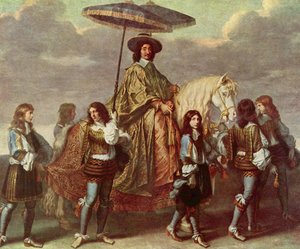
There are numerous travel accounts by European and American writers who spent time in the Middle East. Many of them comment on Islam, whether as missionaries condemning a rival religion or admirers of what they often saw as a vibrant faith in the everyday life of people. But few people are aware of the writings by Muslim visitors to Europe. I am talking about real individuals, not the fictional characters like those in Montesquieu’s The Persian Letters. One of these travelers was the Moroccan Ahmad ibn Qasim al-Hajari, a translator for the sultan, who visited Paris in 1612. As translated by Nabil Matar, Ahmad provides a lively account of what he saw and the debates engaged in.
One of these revolved around the issue of drinking wine, a Christian custom that his French guests thought a kind of sacred duty. The visiting Moroccan set out to disabuse them of such a notion:
“One day before sunset, I walked to the judge’s house to attend to some formalities. The judge said, ‘Would you like to have dinner with us?’
‘I am not permitted to eat some of your foods,’ I replied.
‘We will give you only what you are permitted. We have a visitor from among the nobility of the kingdom. We would like to have you.’
It was the evening of the Prophet’s birth day — God’s prayers and peace be upon him — of the year 1021 [May 13, 1612]. I soon realized that the judge was eager to discuss religious matters before his guest, for the notables among the ‘ifranj’ [French] enjoy discussing recondite matters. So I entered and was given a chair like their’s, with the table between us…
We were in their fast days. So they started talking to each other, hoping to find something to say. But they could not find anything to support their argument. So the judge changed the subject. He said, ‘What was the reason that your prophet prohibited wine?’
‘God almighty prohibited it because the greatest gift He gave to the descendants of Adam is reason,’ I said to him. ‘Wine overcomes reason, which is the worst thing that can happen to a man.’
‘Even among us,’ he said, ‘it is prohibited that man drink to inebriation,’
‘It seems to me that it was prohibited in the Gospel,’ I said, ‘but you did not notice the reference.’
‘Where is the reference?’ they asked.
‘In the invocation that our Sayyid Issa [Sayyidna Issa], peace be upon him, told you to use, and which begins, ‘Our father in heaven,’ until you say, ‘Do not lead us into temptation,’ and they are the more numerous. The first is to me the accurate one.’
‘We have this [invocation],’ they said.
‘Is it permissible to hold temptation in your hand and then pray that God not let you fall for it? For if you add a little wine to what is customary, reason will be overcome, and if reason is overcome, you will fall into temptation, despite asking God not to let you fall.’
‘We drink moderately so that our reason won’t be overcome,’ he said.
‘I believe,’ I said to them, ‘that judges, scholars and noblemen like you want to be just and to avoid lying and committing falsehood. Can you swear by your religion that you never overdrink and [thus have never] lost control of your reason?’
They laughed and started talking among each other, and by their laughter, they admitted what they saw in themselves that they have frequently fallen into temptation because of excessive drinking.
‘Wine brings disease and lethargy to the drinker,’ I said …, ‘while water brings health.’ I then said to them, ‘I read in the Gospels that any angel from God came tot he prophet Zacharias, peace be upon him, and said to him, ‘‘God has accepted your prayer and your wife, Elizabeth, will have a son with you who will be named John [Yuhanna]. And you will have great joy and jubilation. People will rejoice in his birth and he will be great before the Lord, neither drinking wine nor any other intoxicant.†Is this not in your Gospel?’
‘Yes,’ they said, ‘it is so.’
I said, ‘What the angel of God said about the child not drinking wine or any intoxicant – is that to be viewed as a defect or a sign of perfection?’
‘It is perfection in him,’ they said.
‘And it is also perfection in our religion,’ I said to them, ‘that we do not drink wine or any intoxicants.’
Touché. I don’t know about you, but I’’ll drink to that …
Excerpts from Nabil Matar, editor, In the Lands of the Christians: Arabic Travel Writing in the Seventeenth Century, London, Routledge, 2003, pp. 8-11.